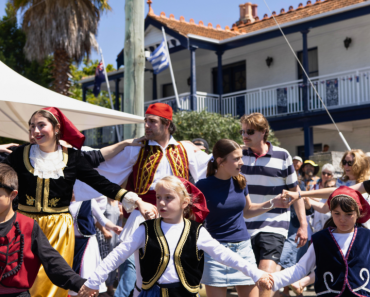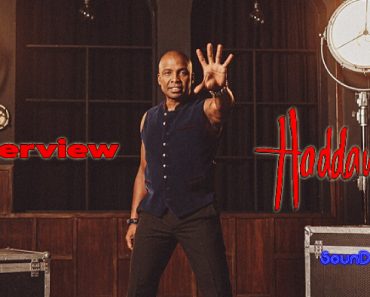
In 2021, Jorge-Rivera Herrans started sharing songs from his unfinished musical, “EPIC: The Musical,” on TikTok. Inspired by Homer’s “Odyssey,” the musical follows King Odysseus on his long, grueling journey home: a decade-long adventure that cost the lives of all 600 of his men. On Dec. 25, 2024, Herrans dropped the ninth and final saga, bringing Odysseus’ and the fandom’s journeys to a close.
I’ve followed Herrans since those early days and I can’t believe how far he’s come. I remember crossing my fingers hoping that he’d release a full album someday. Three years later, we have all 40 songs, packed with lyrics and melodies that have burrowed into my brain and refuse to leave.
There are far too many songs to review individually, so I’ll go saga by saga and highlight my favorites.
The First Saga: “Troy”
Herrans wastes no time plunging us into the action, as the Ithacans take Troy in “The Horse and the Infant.” This song is memorable, not just for its dramatic storytelling, but also because it is one of three times we hear Luke Holt’s commanding performance as Zeus. He tells Odysseus he has to drop a baby off a wall because he said so, leading into “Just A Man.” Although I don’t typically gravitate toward ballads, it might be my favorite of the saga. Something about the rhythmic build near the end, as Odysessus wrestles with the blurred line between man and monster, itches my brain.
Of course, no discussion would be complete without “Warrior of the Mind,” a fan favorite for good reason. While I adore the piano instrumentals and Teagan Earley’s voice, it’s not my cup of tea.
The Second Saga: “Cyclops”
The story kicks off with Odysseus and his crew slaughtering a herd of sheep, only to realize too late they belong to the Cyclops Polyphemus. The Ithacans are then destroyed in “Survive,” the saga standout. The pounding of the drums is electrifying, Odysseus’ shouted commands weave seamlessly into the lyrics, and the gruesome sounds of the Cyclops smashing the crew with his club? Horrifying.
We close with “My Goodbye,” where Athena abandons Odysseus, furious that he spared the Cyclops and gave away his real name (because you can’t have a Greek hero without hubris). Her final words are just her roasting him alive — “You’ve grown soft, your dead friends can attest” — hilarious. The way the lyrics flow effortlessly over the fierce piano, matching the fire in her words, makes this song shine.
The Third Saga: “Ocean”
“Keep Your Friends Close” is better than “Ruthlessness.” There, I said it.
For context, Polyphemus was the son of Poseidon, and Poseidon is displeased not only because the Ithacans hurt his kid, but also because they didn’t finish him off. Yes, you read that right. As a result, they have to face his wrath and a decade-long grudge.
But first, we start with “Storm” and “Luck Runs Out.” They’re like filler tracks, in that they don’t stick with me. “Ruthlessness” is exhilarating and undeniably catchy… but “Keep Your Friends Close” is an EARWORM. Out of all 40 songs, this is the one I find myself revisiting daily. This is the only time the wind god Aeolus — voiced by Kira Stone — appears, but my god, does she make it count! The wind-like instrumentals? The airy background humming? Aeolus’ playful tone? Pure magic.
The Fourth Saga: “Circe”
After narrowly escaping Poseidon, Odysseus and what is left of his crew find themselves on the island of the sorceress Circe, voiced by Talya Sindel. Her vocals are hypnotizing, especially in “Puppeteer” and “There Are Other Ways,” capturing her enchanting yet ominous presence. But what stands out is the musical contrast in “Done For,” when Odysseus’ electric guitar clashes with Circe’s elegant violin as they battle. Herrans has a gift for attributing distinct musical motifs to each character that shines here.
It’s hard to choose, but my favorite song is “Wouldn’t You Like.” It’s our first introduction to Hermes, played by TROY, and the pop beat is infectious. His playful delivery and laugh capture Hermes’ mischievous charm.
The Fifth Saga: “The Underworld”
Odysseus and his crew sail into the Underworld to find the dead prophet, Tireasus. Though brief, the saga carries a lot of emotional weight, as Odysseus confronts his fallen comrades in “The Underworld” and undergoes a pivotal character shift in “Monster.”
However, my favorite track is “No Longer You.” Tireasus glimpses Odysseus’ future, and Herrans incorporates the details of the prophecy into the hauntingly beautiful song with such skillful subtlety. If you listen closely toward the end, you’ll hear a chilling choir in the background that predicts the upcoming sagas. I didn’t catch this until about the seventh or the eighth, and it blew my mind.
The Sixth Saga: “Thunder”
If only I could learn to love “Different Beast” and “Mutiny.” They serve their purpose in moving the plot forward, but they exist to set up the true stars.
The main event is Zeus punishing Odysseus and his crew for slaughtering sacred cows in “Thunderbringer.” The lyrics are so artistically grotesque, perfectly capturing Zeus as the sleazy, power-hungry womanizer he is in many myths. He personifies pride as a woman — “Pride is a damsel in distress” — and then describes her in typical Zeus fashion — “Hiding away where only I can undress her.” And the way he sings? Not vengeful — just a god toying with mortals. The thunder rumbling in the background is the perfect touch.
Next are two of my favorites in the show. I have been waiting for “Scylla” since it was first teased, and KJ Burkhauser’s guttural vocals do not disappoint. But “Suffering” caught me completely off guard. It wasn’t teased in the early days, so I had no expectations, but now I can’t stop listening to it. The playful exchange between Odysseus and the sirens is beautifully woven into the lyrics, and the instrumentals are hypnotic.
The Seventh Saga: “Wisdom”
We jump from a brief look into the life of Odysseus’ son Telemachus (“Legendary,” “Little Wolf,” and “We’ll Be Fine”), to Odysseus’ fate after the sixth saga (“Love in Paradise”), and finally to Athena’s confrontation with Zeus (“God Games”).
I like “Legendary” and “Little Wolf,” though the latter left me underwhelmed. I had high hopes for it since the early days, but the background vocals didn’t have the power I expected. “We’ll Be Fine” doesn’t do it for me either. It’s unfortunately painfully clear that the song is outside of Earley’s vocal range. “Love in Paradise” is my second favorite here. The highlight is Barbara Wangui as Calypso — her vocals are mesmerizing and the tropical-tinged instrumentals perfectly set the scene.
“God Games” is my favorite of the saga — though that might be because we finally get introduced to more gods. Athena has to convince Apollo, Hephaestus, Aphrodite, Ares, Hera, and ultimately Zeus to free Odysseus from Calypso’s grasp. Herrans nails the musical motifs here, weaving in sounds that reflect each god’s domain. Hephaestus’ section, for example, is accompanied by pounding hammers, perfectly encapsulating the God of the Forge.
But the best part of this track is Zeus. We see a completely different side of him. Here, finally, he is furious. I did not think Holt’s voice could go any deeper. It’s a chilling and powerful way to close out the song.
The Eighth Saga: “Vengeance”
Odysseus finally departs from Calypso’s island in “Not Sorry For Loving You,” and again, Wangui’s vocals are stunning. The song itself is fantastic, but what stands out is how the lyrics make you almost sympathize with Calypso, although she’s manipulating Odysseus (“Then I am sorry if my love is too much for you”).
We also get another Hermes track, “Dangerous.” It’s another upbeat, infectious song — Hermes really does get all the bangers. “Charybdis” is also great. I don’t have much to say about it other than I love the lyrical flow, making it an incredibly satisfying listen.
Now, the moment I’ve been waiting for for three years: “Get In The Water.” Poseidon finally confronts Odysseus in this powerhouse song. He is a pure menace (“both your wife and son will drown”), and Steven Rodriguez’s growl? Perfection. The crashing waves in the background only add to it all — it feels like I’m right there, caught in the storm.
Odysseus wins the battle in “Six Hundred Strike,” and I love how unhinged he becomes. I won’t spoil too much if you haven’t listened, but it’s a shocking way to end the penultimate saga.
The Ninth Saga: “Ithaca”
We finally meet Penelope, Odysseus’ wife, played by Anna Lea. And Lea is phenomenal. She embodies Penelope’s grief, yet never loses the quiet strength that defines her. “The Challenge” is a great introduction to an even greater saga.
Next, we get “Hold Them Down,” “Odysseus,” and “I Can’t Help But Wonder.” “Hold Them Down” is chilling in all the right ways. Odysseus triumphantly returns in, well, “Odysseus,” and Herrans nails the challenge of musically narrating an action-packed battle. It’s a visceral track and shows a completely different Odysseus from the one we knew.
Odysseus emotionally reunites with his son in “I Can’t Help But Wonder,” but it doesn’t compare to “Would You Fall In Love With Me Again.” Odysseus finally sees Penelope and it is so bittersweet. He wonders if she could ever love him again after all these years, after everything he’s done. I love how Penelope responds, the anger in her tone and words, wondering how he could ever doubt her love for him. It’s perfect.
In the background, the guitar descends while the violin crescendos, finally meeting in perfect harmony. It’s such a subtle yet beautiful choice that makes the song feel complete. This is a masterpiece — the perfect conclusion — and I’ve had it on repeat.
All in all, I adore this musical. Herrans puts a fresh spin on the Greek epic without straying too far from its core: a man trying to get home to his wife. If you’re looking for a Greek-inspired musical with incredible instrumentals and unforgettable characters, this is the one for you.






